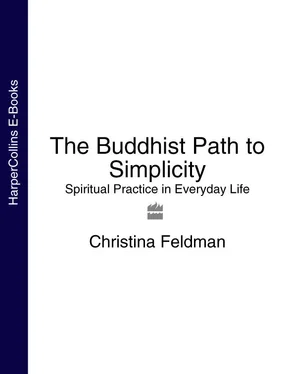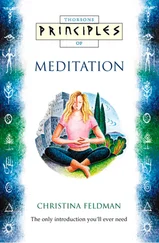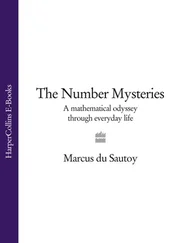In his first discourse, the Buddha stated that craving is the cause of sorrow and pain. The craving to gain what we do not have, the craving to get rid of what we do not want, and the craving for experience and identity, are all manifestations of an energy that leads us to depart from the truth of what is in each moment. The Buddha went on to say that the cause of sorrow lies in our own hearts and minds; the cause of happiness lies in our own hearts and minds. Our immediate response may be to say that this is too simplistic. There appear to be so many things that cause us sorrow—the job we dislike, the relatives we struggle with, the aches in our body; the list is endless. As we look more deeply we should ask: do any of these hold the power to cause us to be lost in sorrow, pain, or confusion? Or is it the movements of our minds that dismiss, judge, reject, and avoid, which cause the greatest pain and sorrow?
We can go through life with the mantra, “This shouldn’t be happening. I want something else to happen. This should be different than it is.” Pursuing what we want and do not have, trying to get rid of what we have and don’t want, losing interest in what previously fascinated us, are all the tentacles of a single energy of craving. It is a powerful energy that leads us to flee from the moment and ourselves. As our appetites become jaded, we find ourselves needing ever more intense excitement and experience. The Buddha compared this energy of craving to a forest fire which consumes the very ground that sustains it. Our energy, time, well-being, and peace are consumed in the fires of craving. Renunciation, learning to let go gently and clearly in our lives, extinguishes the fire; it is the antidote to craving.
In the last century an affluent tourist went to visit a Polish rabbi, renowned for the depth of his learning and compassion. Arriving at the impoverished village where the rabbi made his home, he was astonished to discover the rabbi living in a simple room with only a few books and the most basic furniture. “Rabbi, where is all your furniture, your library, your diplomas?” he asked. “Where are yours?” answered the rabbi. “Mine? But I am only a visitor here.” “So am I,” replied the rabbi.
In the early 70s I traveled to India in search of a spiritual path and found myself in a Tibetan refugee village. I found a community of people who had lost so much: their country, their homes, their possessions, and their families. What was so stunning was the absence of despair, rage, hatred, and desire for vengeance. Their openhearted welcome and generosity, the smiles upon their faces, the devotion that permeated the camp, were a testimony to the reality that they had not lost their heart.
There is a sacred hunger rooted in our hearts—a yearning for freedom, happiness, connectedness, and peace. It is a hunger that prevents us from surrendering to despair and disconnection, that inspires us to continue searching for a way of feeling truly intimate in this world, at one with life, free from conflict and sorrow. In our confusion, this sacred hunger becomes distorted and diverted; it turns into craving and the pursuit of projected promise invested in experience and things outside ourselves.
Renunciation is not a dismissal of the world. It does not involve surrendering the joy found in all the precious and delightful impressions and experiences that will visit us in this life. Through withdrawing the projected promise invested in sensation, impression, and experience, we learn to find a sense of balance that embraces the pleasant, unpleasant, and neutral experience. Believing that happiness and fulfillment lie outside of ourselves we project onto the 10 thousand objects and experiences in this life the power for them to devastate, enrage, gratify, or elate us. We then become a prisoner of those 10 thousand things. Withdrawing this projected promise, we can deeply appreciate the pleasant, remain steady in the midst of the unpleasant, and be fully sensitive to the neutral impressions and experiences life brings. We discover that the root of happiness lies not in what we are experiencing but how we are experiencing it. It is the withdrawal of the projected promise and the surrender of the fear of deprivation which enables a relationship to life that is rooted in sensitivity, compassion, and intimacy. Craving propels us outwardly, away from ourselves and from this moment, into an endless quest for certainty and identity. By exploring the energy of craving and loosening its hold, we are returned to ourselves, able to acknowledge the sacred hunger within us for intimacy and awakening. At ease within ourselves, we discover a profound refuge and happiness rooted in our own capacities for awareness and balance.
The Enlightened and the Unenlightened
The Buddha spoke about the distinction between an enlightened and an unenlightened person. Both the enlightened and the unenlightened experience feelings, sensations, sounds, sights, and events that can be pleasant, unpleasant, or neutral. When an unenlightened person encounters the unpleasant experience they grieve, lament, and become distraught and distracted. Two levels of sorrow are experienced; one in the actual experience and one in the reactions and story about it. It is as if a person crossing the pathway of an archer was shot by an arrow; whether enlightened or unenlightened, that person would experience pain. The difference lies in the level of both the story and the fear that are added to the experience. In seeing the archer prepare to shoot a second arrow, the unenlightened person would already be anticipating its pain, building a story centered around living with a wounded leg and entertaining thoughts of anger towards the archer. In the heart of the unenlightened person, layers of aversion and associations with the past and future lead them to depart from the reality of what is actually being experienced in that moment. The unpleasant experience is layered with aversion and resistance. We try to end the unpleasant experience by finding one that is more pleasant or by suppressing or avoiding it. In the midst of any of the unpleasant experiences, we need to ask ourselves what is more painful, the actual experience or the stories, fear, and resistance with which we surround it. Calm simplicity does not depend upon the annihilation or control of the unpleasant experience but is born of our willingness to let go of the layers of our stories and fears.
The enlightened person is not exempt from any form of feelings, whether pleasant, unpleasant or neutral, but is not bound or governed by them. The arrow will hurt, but the pain of the body will not be matched by sorrow and struggle in the mind. Blame, judgment, and retaliation are the children of fear. Wise responsiveness, equanimity, and discriminating wisdom are the children of deep understanding. The enlightened person would find little value in shouting, “This is unfair” at the world, would not seek to take revenge upon the archer nor vow to never venture out again. The enlightened person knows the pathways of wise response rather than blind reaction. Surrendering the story is not a dismissal of the wounded leg but is an empowerment, releasing the capacity to care for what needs to be cared for with compassion and responsiveness, letting go of all the extra layers of fear, apprehension, and blame.
The pleasant experience evokes a different response and different story line in us. We want more, we don’t want it to end, we strategize the ways to defend it—it is layered with craving and grasping. We have a moment of calm during meditation and find ourselves rehearsing our debut as the next world-famous teacher. A smile from a colleague and in our minds we are already embroiled in the romance of the century. Once more our stories divorce us from the simplicity of the moment and we are puzzled and disappointed when these stories are frustrated. Pleasant experiences are hijacked by craving and wanting, and once more we are not living in the simplicity of the moment but in the dramas of our minds. In the midst of the pleasant experience, we can learn to let go of our stories, projections, and fantasies. We can learn to love what is.
Читать дальше












